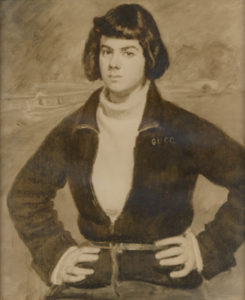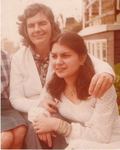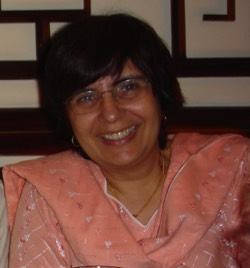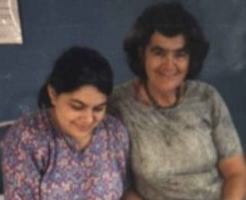Christian Abbas (née Vlasto) on her husband Ghulam Abbas

Christian Fanny Croil (Michel) Vlasto aka Zainab (1921-2009)
Many people who read these pages will have known my dear late husband through his writings only. Some will have known him personally and will also have read his books. No one will have known him as well as I did without having read his stories.
Though I am sad not to be able to read Abbas’s stories in the original he used to relate them to me in English, briefly, giving me the gist only. [See: Between Two Women.] The gist was very important to him. It seemed to hold the essence of all that he was to build about it. He would ask me how I thought he should develop this or that situation. It was not so much for my help, though I used to make suggestions, but he liked to externalise the trouble spots. Often he had not written a word of the story by then. He liked to have the whole plot, down to every detail, straight in his head before putting it on paper.
Christian Croil Vlasto who married Ghulam Abbas, is pictured here in her World War ll rôle as captain of a Grand Union Canal Company barge team. The original painting by Bernard Hailstone R.A. was commissioned by the British government in 1946 and is currently owned by the Imperial War Museum, London.

Neelofar Moid Malik Abbas daughter of Ghulam and Christian(Zenab) Abbas
The secret joy I got from listening to these stories gave me the same sort of pleasure as watching a flower open and was just about as rare. Abbas could keep ideas for stories in his head for twenty years or more and when they were ripe he would write them over night.
He liked the hours of calm and quiet for both his writing and his reading. In the early Fifties while we were building our house near Nursery [Karachi] he would write a story or an episode of Gondniwalla Takkia sitting on his charpai under his mosquito net with a kerosene lamp perched precariously beside him.
As we had no walls yet, only pillars, he could be seen from a distance in his golden cocoon, huddled under his sheet in summer or loki (blanket) in winter, his French beret pulled down over his ears to keep the mosquitoes out. Silently he would cover the halves of the folded pages with his neat clear handwriting.
Abbas aimed for precision in expression and word perfection. I learned this when, during the late Fifties, we wrote together a translation or arrangement of the Folk Tales of Pakistan in English. We would argue for hours over the choice of each word or turn of expression, cutting it down to its essential simplicity. I was amazed then at his skill in manipulating the tedious, ballad-like plots of these traditional tales. He would pluck the heart out of them and reset it, organising the contents to add tension and suspense. It was his consummate skill as a story writer that made it possible.

Mariam (Ghulam) Abbas
The book Folk Tales of Pakistan was published under my name [Christian Abbas] and was often presented to visiting dignitaries in the Ayub [Khan] era. Of course it contained stories of the then East and West Pakistan [Bangladesh & Pakistan]. It was illustrated most beautifully by Hanif Ramij [spelling?].
Of his own stories, Overcoat was probably the only one of those we translated together which was completed. He very much wanted me to translate more but I found it impossible to fit the hours of tussle every sentence would require into my busy life. His understanding and knowledge of English was so good [that] I again and again suggested that he should give me his own written translation and I should revise it in my own time. But no, it seemed it could not be done. I have my regrets.
From an early age Abbas had enjoyed stories. It was his grandmother’s sister who used to keep him spell-bound with her stories told in Persian. Later he enjoyed Urdu romance. People read for all kinds of reasons. Abbas always wrote for pleasure.
The story of how he came to be an editor at the early age of 16 always enchanted me.

Neelofar (Ghulam) Abbas
Born in Amritsar [then India] in 1907, he was a small child when he moved to Lahore which was always the city of his heart. His father had died when he was very young and his mother married again. His step-father, of whom he was very fond, died when he was about nine years old.
The household then consisted of his mother, his grandmother and his great-aunt who for many years was bed-ridden. She sewed beautiful dolls and used to sell them for a little spending money. His mother sold what property she had and opened a small pan shop to keep the son of the family at school studying.
Having reached the 9th class, Abbas found other things more interesting than study. There was cricket, kubuddi [spelling?] and a small home-made cinema device about which he was most enthusiastic, and reading Urdu novels.
When he failed to get into the 9th class, he grew up. Feeling his responsibilities keenly he refused to go back to school. Some well-meaning family friend told his mother he would get him a job and did – chalking the destinations on the goods wagons at the railway yard.
Abbas felt humiliated and without telling his family he sought out his literary friends who offered him a small sum for translating English novels into Urdu. Knowing practically no English, he accepted.
Daily he took the lunch-pack his mother gave him and instead of going to the railway yard he went to the graveyard. There he spent all day and with the constant help of the dictionary, translated his English story into Urdu.
By the end of the month he had completed it and received payment for it, which was about equivalent to what he would have received at the goods-yard. This he handed over to his mother and continued at his labours.
It was only at the end of three months that he told his mother the true nature of his employment. I know only that Washington Irvine’s Alhambra was one of these early translations. Years later we went to Spain together and visited the Alhambra and a little of the silver star dust of his old enthusiasm for Irvine’s masterpiece rubbed off on me as we explored the ancient muslim palaces, mosques and fortresses together.
It was as a direct result of his early translation work that, through one Hakim Sahib, Abbas became editor of Phool magazine for children. Abbas always felt a great respect for Hakin Sahib and once took me to meet him in his tiny dwa-Khana [spelling?] in ‘Pindi. He was a very old man. Later we heard that he had died.
In material things Abbas was wise, instinctive and practical; not greedy or ambitious.
I was perhaps one of his instinctive investments. He wanted me and he got me. I joined him and his growing family wholeheartedly in Karachi in 1952. Soon after my arrival, while many government servants were content to live in the quarters provided, Abbas decided to take a loan and build a house. Later he took another loan when few at his level of income would have dared to do so and built a second storey. It was a struggle for all of us as the older children well remember.
Paying the instalments on the house left us very little to live on and by the 20th of each month we had to change our supply store. My personal reaction to such a state of affairs was close to panic. It was at such times that Abbas would return from the second-hand shops in Nursery with a gadget or flight of fancy to please our hearts. Once he brought a lamp with a frilly shade and at another it was a delicate vase shaped like a running goose with clusters of china roses about its neck and body.
Without electricity and in the dusty environment of our half-finished house the frilly lamp and the china goose rekindled hope and courage for the future.
Abbas was deeply committed to each and every one of us from his ageing mother – who chased the neighbour’s children out of the house with her chappel for wasting electricity by playing on our piano – to the youngest and ninth child who died outside our gate in a road accident.
The rest grew up, all able to fend for themselves. His children, their abilities and achievements, were a source of great interest, pride and stimulation to Abbas. He was always ready to assist them, not merely with advice but with physical endeavour.
But he had a life of his own too. He would the pavements from Saddar to Arambagh surveying the second-hand book shops. He was known to all the booksellers as Chachaji and squatting in front of the stalls he thumbed his way through the volumes. He bought for himself. He bought for the children, and he bought for me, treasures in picture and print on which we all developed.
Reading was his passion, listening to music was a close second, playing chess was a pass-time [sic]. He listened to and read anything with content. the content was according to his own judgement and would not necessarily have been the same as our national censors. His reading was international and through books he taught himself enough French to read, in the original, works of masters like Proust and Maupassant.
His thumbs seemed to grow from the books he fingered as he squatted and sifted and bargained. Occasionally he found a rare book which made him very happy, but the reading matter he collected over the years grew into a large mass of books among which he lived. All around his room, which he kept locked, were stacks of books from the floor to window level. In a short while he could find any book one might request of him. His memory of detail and content always amazed me. he was never confused: his knowledge deep but never obtrusive.
Sometimes the rain came in and all the book had to be moved and [then] moved back again. Only many hands, large and small, made this possible. Books of the same size had to be stacked together.
Abbas loved music. Alongside his books were ever-growing piles of records and tape cassettes. He moved with the times and treasured his sound recording equipment. He had a flute, a violin, a Spanish guitar, an electric guitar and a Japanese stringed instrument. His favourite was the Spanish guitar.
He love to listen to recordings by Segovia and other Spanish masters. He painstakingly transcribed Indian music into western musical scores to play on his beloved Spanish guitar. I am not saying he played well… but how he enjoyed it!
Abbas was full of surprises. One evening, sensing that he was going to Saddar, I said I’d go with him. He was a little reluctant. However, I went. he tried to leave me in some shop or other, saying he’d be back in a minute; but refusing to be ‘parked’ I went along with him. To my surprise he went to a food shop where the vendor had lined up a gang of beggars who were squatting on the pavement’s edge. Abbas ordered khanna and dehi [spelling?] for all of them.
When they had finished he asked each one personally if they had had enough. Perhaps he was fulfilling a request or an obligation or an impulse. I don’t know. I never asked.
He could manage the wiliest rogue and do business with him or take services from him. He enjoyed strange characters. He always called labour from their homes. An old painter lost on drugs was kept at work till the job was done, and well done, on daily wages.
Abbas would sit and watch the progress, chatting and encouraging him from start to finish. We had to provide good tea and meals on time. Later we would enjoy the funny stories he wove around this character. They were always humane and amusing.
He drove a hard bargain but was always sympathetic and generous to the end. Labour always returned to work again. This man returned to work for us after my husband’s death, with disastrous results.
Abbas belonged to an era when the arts were valued for their own sake. It is sadly not realised what a great humanising power the arts are in a world ruled by science and the acquisition of power
The words Art, Literature and Music slipped off his tongue as drops of nectar which had a deep well in his heart. He was not an ambitious man. He was grateful man. He loved his country and his people and his religion. He was always hopeful for the future.
Christian Abbas (née Vlasto) was born in 1921. A painter, engraver, illustrator and teacher, she studied at the Central School of Art, London.At the outbreak of World War ll she worked for the Royal Navy, drafting plans near Bath, UK. She then volunteered as an operator of barges on the Grand Union Canal for the remainder of the war. This involved carrying vital supplies and munitions during the German blitz of Britain’s main industrial centres.
Immediately after the war the Imperial War Museum commissioned an oil portrait of Christian Vlasto from Bernard Hailstone R.A. aged around 22, in wartime uniform as a barge girl for the Grand Union Canal Company. This was one of series of portraits in which one individual was selected to represent the numerous forces and organisations that had contributed to the war effort.
In 1952 she moved to Karachi to marry the writer and broadcaster Gulam Abbas where for many years she introduced revolutionary teaching methods in schools for young children. She had four children of her own: Causer (killed in a road accident in the 1960s), Kamram, Mariam and Neelofar (died c.1992).
